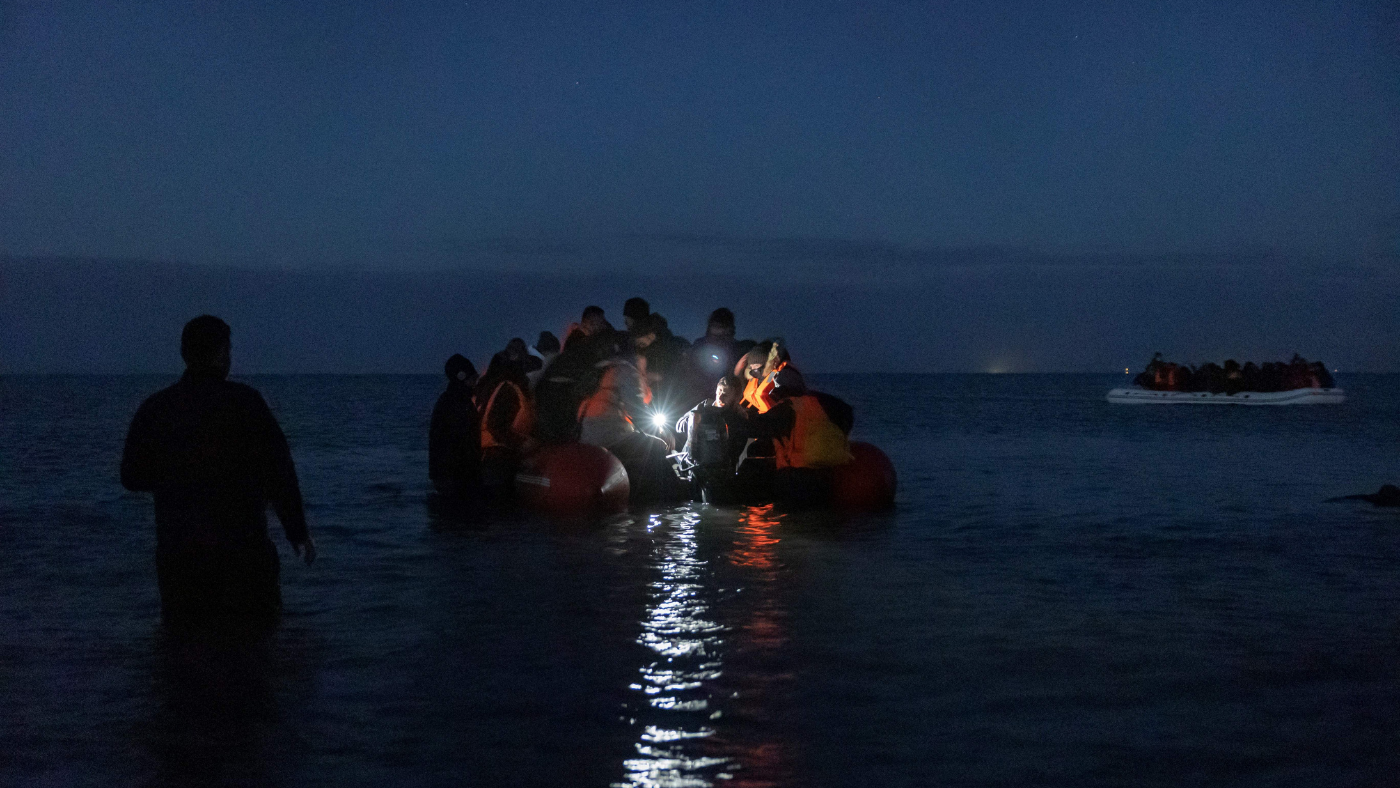Stop the boats: will immigration define the next election?
Battle lines are being drawn on the contentious topic ahead of a likely 2024 general election

A free daily email with the biggest news stories of the day – and the best features from TheWeek.com
You are now subscribed
Your newsletter sign-up was successful
The government’s Illegal Migration Bill, unveiled by the home secretary this week, has set the Conservative Party on a potential collision course with the House of Lords, the courts, humanitarian groups and the Labour Party, in a calculated move that some pundits believe may be setting up the issue as one that defines the next general election.
Rishi Sunak has declared he is “up for the fight” with judges in Europe over his plans to detain and deport nearly every migrant who arrives in the UK in small boats.
But some analysts, including The Spectator’s political editor Katy Balls, believe he is actually spoiling for a fight with the Labour Party. The prime minister’s real hope, Balls said, is that the bill will “create a dividing line between the Tories and Labour on immigration”.
The Week
Escape your echo chamber. Get the facts behind the news, plus analysis from multiple perspectives.

Sign up for The Week's Free Newsletters
From our morning news briefing to a weekly Good News Newsletter, get the best of The Week delivered directly to your inbox.
From our morning news briefing to a weekly Good News Newsletter, get the best of The Week delivered directly to your inbox.
What did the papers say?
The government plans to stop migrants from crossing the Channel “rely on deterrence”, said The Times in its leading article this morning.
The proposal, unveiled by Home Secretary Suella Braverman, will mean that almost all asylum seekers who reach the UK on small boats will be detained without bail for 28 days and then deported either back to their home country or another destination if safety is an issue. They will also have no right to challenge their deportation under human rights law while in the UK, and if they are deported will lose all right to return to the UK in the future.
The government’s intention to make Britain “such a hostile environment” that migrants simply switch to legitimate modes of entry “are certainly bold”, The Times said. However, they are also “politically toxic”.
For one thing, the plans to deter asylum seekers “hinge on” getting the Rwanda plan “up and running”, said the i news site’s Arj Singh.
A free daily email with the biggest news stories of the day – and the best features from TheWeek.com
The government insists that Sunak’s controversial new laws would have a “quite powerful” deterrent effect on small boat crossings “quite quickly”. But according to modelling for the former home secretary Priti Patel, thousands of asylum seekers would need to be sent to Rwanda for any deterrent to work and that scheme has faced a series of legal challenges which have meant “it is yet to deliver a single flight of refugees to the African country”, Singh said.
It is not impossible that by the time the next election arrives in 2024 the legislation could still be “bogged down” in a battle with courts, frustrated by the European Convention on Human Rights, which would mean the “scene could then be set for a re-run of the party’s 2019 election pledge to ‘Get Brexit Done’, only with removal from the ECHR the cornerstone of the 2024 manifesto”, said HuffPost.
For its part, Labour “looked likely to oppose the Government’s crackdown on Channel migrants”, said the Daily Mail, with Keir Starmer dismissing the scheme as “not workable”.
Indeed, workability is the “attack line the leader of the opposition’s office wants to fight on”, agreed The Spectator’s Katy Balls, but others within Labour, such as Diane Abbott, have criticised the plan on humanitarian grounds, which may be precisely the battle that aides in No. 10 are hoping for.
Braverman was “quick to dismiss the opposition as lacking a solution of their own” or even “an intention to deal with the problem”, Balls added.
What next?
If a clash of immigration and asylum policies does become the political battleground for 2024 that the Conservatives hope, Britons are still more likely to trust Labour, according to new research by Ipsos. But the Conservatives are closing the gap.
According to the findings, a third of Britons trust Labour to have the right policies towards asylum seekers (35%), and immigration (34%), ahead of the Conservatives on 28% – “but trust in the Conservatives has risen 7-8 points since November”, the market research firm said.
For The Times’s editorial board, Britain is “not an unwelcoming country to deserving cases” but “it has the right to protect its borders.” In making small boats a central platform of his prime ministership, Sunak “is taking a considerable but justifiable political risk”.
Not so, responded The Guardian in its own leading article today. The government’s playbook “is not only callous but dangerous and inflammatory”. It is for this reason its legislation “must be opposed in political and humanitarian terms, as well as pragmatic ones”.
However, leading up to the 2024 election, this may be exactly the battle the Conservative Party wants, said Sky News’s Ali Fortescue. “Labour know they need to convince voters they can be the party of tackling immigration”, but they know too that they are “treading a tricky political path”.
Yet even for Sunak, “talk is one thing, delivery another”, Fortescue added, and his “stop the boats” slogan is “not as straightforward as it seems”.
The slogan is a policy target “that has eluded not just successive British governments but every government in the world”, said the Financial Times’s Stephen Bush. “No country, no matter how authoritarian, has managed to prevent all movement in or out of it”, he added.
“I don’t think Sunak will be the first to achieve it…and that he seems determined to go into the next election talking about his probable failure on the issue is the biggest gift to the Labour Party since Kwasi Kwarteng’s mini-budget if you ask me,” Bush concluded.
Arion McNicoll is a freelance writer at The Week Digital and was previously the UK website’s editor. He has also held senior editorial roles at CNN, The Times and The Sunday Times. Along with his writing work, he co-hosts “Today in History with The Retrospectors”, Rethink Audio’s flagship daily podcast, and is a regular panellist (and occasional stand-in host) on “The Week Unwrapped”. He is also a judge for The Publisher Podcast Awards.
-
 Political cartoons for February 16
Political cartoons for February 16Cartoons Monday’s political cartoons include President's Day, a valentine from the Epstein files, and more
-
 Regent Hong Kong: a tranquil haven with a prime waterfront spot
Regent Hong Kong: a tranquil haven with a prime waterfront spotThe Week Recommends The trendy hotel recently underwent an extensive two-year revamp
-
 The problem with diagnosing profound autism
The problem with diagnosing profound autismThe Explainer Experts are reconsidering the idea of autism as a spectrum, which could impact diagnoses and policy making for the condition
-
 How are Democrats turning DOJ lemons into partisan lemonade?
How are Democrats turning DOJ lemons into partisan lemonade?TODAY’S BIG QUESTION As the Trump administration continues to try — and fail — at indicting its political enemies, Democratic lawmakers have begun seizing the moment for themselves
-
 How did ‘wine moms’ become the face of anti-ICE protests?
How did ‘wine moms’ become the face of anti-ICE protests?Today’s Big Question Women lead the resistance to Trump’s deportations
-
 How are Democrats trying to reform ICE?
How are Democrats trying to reform ICE?Today’s Big Question Democratic leadership has put forth several demands for the agency
-
 Why is Tulsi Gabbard trying to relitigate the 2020 election now?
Why is Tulsi Gabbard trying to relitigate the 2020 election now?Today's Big Question Trump has never conceded his loss that year
-
 Businesses are caught in the middle of ICE activities
Businesses are caught in the middle of ICE activitiesIn the Spotlight Many companies are being forced to choose a side in the ICE debate
-
 Will Democrats impeach Kristi Noem?
Will Democrats impeach Kristi Noem?Today’s Big Question Centrists, lefty activists also debate abolishing ICE
-
 Do oil companies really want to invest in Venezuela?
Do oil companies really want to invest in Venezuela?Today’s Big Question Trump claims control over crude reserves, but challenges loom
-
 What is China doing in Latin America?
What is China doing in Latin America?Today’s Big Question Beijing offers itself as an alternative to US dominance